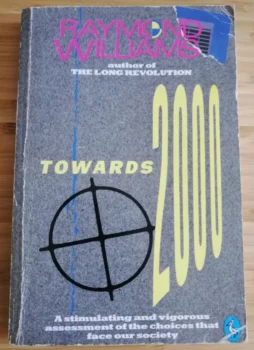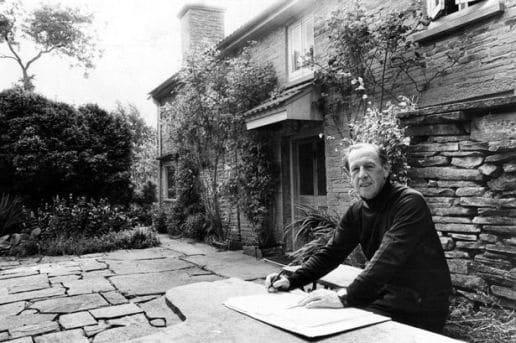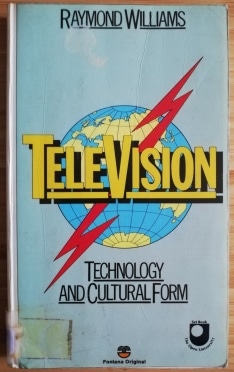‘From Production to Livelihood – Raymond Williams on Ecosocialism’: Part 3
The third and final part of our mini-series on Raymond Williams, ecology, and socialism is an article by Peter Hill. Skilfully drawing out the central themes of Williams’s essays on ecosocialism, exemplified by parts one and two of this week’s special feature, Peter offers readings of the wider engagements with production and livelihood found across books such as The Country and the City (1973), Television: Technology and Cultural Form (1974), and Towards 2000 (1983).
Peter Hill writes…
In ‘Socialism and Ecology’ and ‘Ecology and the Labour Movement’, Raymond Williams is arguing the case for a political convergence. Socialism and the labour movement on the one hand, and the ecological or environmental movement on the other, should join forces and both be transformed in the process. This case was by no means an obvious one in the early 1980s. If it seems almost self-evident today, that is a measure of Williams’s foresight as well as of the real achievements in this direction over the last half-century. Ecosocialism has now been discussed for decades; proposals like the Green New Deal have brought environmental concerns to the centre of trade union and left agendas; and a large part of the environmental movement has identified capitalism as its enemy, and the labour movement as a crucial source of support. The juncture is not complete, of course; many of the obstacles Williams identified within each movement remain. And above all, the prospect the combined forces face is if anything more daunting than it was in the 1980s, as the full scale of ecological crisis becomes clear amid renewed capitalist and right-wing hegemony.
The political case Williams puts is underpinned by a major shift in his thinking–and it is this that I will especially discuss here. The challenge of ecological crisis and also of the deindustrialisation of Britain–‘Ecology and the Labour Movement’ was given as a talk in 1984, the year of the Miners’ Strike–pushed Williams, typically, not to particular adjustments or additions, but to a reworking of some of his most central concerns. In the final part of his 1983 book Towards 2000, this comes through as an ambitious project. Politically, he seeks to unite all the ‘resources of hope’–not just the labour and ecology movements, but also the peace and women’s movements, and a range of intellectual trends–in a common effort for a new social order. Theoretically, he bases this on a new set of conceptions: ‘at least the outline of a unified alternative social theory’ [1]. Placing Towards 2000 and the two ecological pieces alongside other writings from the later part of his life gives us a fuller picture of this last major reorientation in Williams’s thinking.
Capitalism, Williams argues, had ‘deeply embedded’ a way of looking at the world–both non-human nature and human beings–as ‘raw material’ [2]. This raw material could be exploited for the production of abstract, aggregated quantities of goods, and when no longer required it could be dropped. In subordinating all else to ‘production and its priorities’–especially profit–this order relegated ‘broader human and social issues’, and likewise issues of humans’ relations with nature, to the status of ‘secondary effects’. Changes in both society and ecology could be seen only as ‘by-products’ or ‘side-effects’ of the drive to produce [3]. Both socialism and the labour movement had in part taken over this orientation towards production, in notions of the ‘conquest of nature’ as liberatory, or in the assumption that the solution for poverty was simply more production.
 But this was to remain imprisoned within capitalist categories. Instead, a ‘different social order’ has to start, not from production, but from the ‘deeper’ and ‘more human concept’ of livelihood. This points towards ‘practical, self-managing, self-renewing societies, in which people care first for each other, in a living world’ [4]. It enables sustainable interactions with non-human nature: we can ‘select those many interventions’ in nature ‘which support and enhance life’, while rejecting damaging ones [5]. It also reorients us towards ‘a way of life and not a way of producing’–not quantitative ‘growth’, but what R. H. Tawney called ‘a right order of life’. This fuller perspective allows us to see capitalism and production as a ‘deformed order’, and to reject its polarities, like that between ‘emotions and rational intelligence’ [6].
But this was to remain imprisoned within capitalist categories. Instead, a ‘different social order’ has to start, not from production, but from the ‘deeper’ and ‘more human concept’ of livelihood. This points towards ‘practical, self-managing, self-renewing societies, in which people care first for each other, in a living world’ [4]. It enables sustainable interactions with non-human nature: we can ‘select those many interventions’ in nature ‘which support and enhance life’, while rejecting damaging ones [5]. It also reorients us towards ‘a way of life and not a way of producing’–not quantitative ‘growth’, but what R. H. Tawney called ‘a right order of life’. This fuller perspective allows us to see capitalism and production as a ‘deformed order’, and to reject its polarities, like that between ‘emotions and rational intelligence’ [6].
The argument that capitalism involved essentially the same attitude towards people and nature leads Williams to a redefinition of ‘the connection between the forces and the relations of production’ [7]. Marxist theory had often defined the forces of production as technology, or the ‘economic base’ necessary, under capitalism, for the production of commodities. Against this, and the technological determinism it could lead to, Williams restated a broader definition of ‘productive forces’ as ‘all and any of the means of the production and reproduction of real life’ [8]. Culture and communication were then themselves productive forces, not part of a secondary ‘superstructure’. On the other hand, Williams also argued against isolating the relations of production, the social relationships that particular productive processes entailed. He took from the East German writer Rudolf Bahro an analysis of the error of the ‘actually existing socialism’ of the Eastern Bloc. This claimed to have revolutionised social relations, but still saw nature as raw material to be exploited for production. To genuinely change the mode of production would require changing forces and relations together.
Here Williams is still operating within the categories of production, its forces and relations. In the next step of his argument, he moves beyond this. Production is now the problem, and the Marxist notion of ‘mode of production’ is ‘at some important points a prisoner of the social orders which it is offering to analyse’. There is in fact, he suggests, only one mode of production, in the sense of a production-oriented order ‘which comes to dominate both society as a whole and […] the physical world’: capitalism [9]. The concept of ‘mode of production’ ‘has been most successful […] in its analysis of capitalism’ and its ‘variations’, but ‘can never really look beyond it’–for this would require ‘radical change, in hard social and material terms, in the idea of production itself’ [10].
This change, as we have seen, is to the idea of livelihood. This is the foundation of the new ecosocialist society he wants to create, but also ‘an old conception’ which pre-existed industrial capitalism. By pointing to variability in the past, he can show that both social and human-natural relationships are not limited to ‘production’ and what it entails. The human ‘intervention in nature to transform it as new means of livelihood: that is, to produce’ was important. But it was only one, ‘specialised’ kind of intervention, within a range of other interactive relationships with and interventions in nature. These often entailed a ‘sense of a connection with constituted nature’ and ‘continuing interactive observation, within both a physical and social world.’ The difficulty comes when all this was ‘abstracted and generalised as “production”’, and elevated into ‘the central priority over all other human and natural processes and conditions’ [11]. He does not see even this as beginning only with capitalism, and refuses sharply to idealise preindustrial orders as ‘a “natural” or “moral” economy’ [12]. Even these, he says, could make ‘significant and destructive intervention[s] in the natural environment’ [13]. When the eighteenth-century agricultural and industrial revolutions began to apply ‘new kinds of power’, though, there was a ‘qualitative change’, orienting the society decisively towards production [14].

This leaves questions Williams does not resolve, but on which we can tentatively reconstruct his thinking through his partial statements and his writings on other subjects. If ‘livelihood’, even under capitalism, remains broader than ‘production’, what else does it comprehend? Williams at least implies that it must include ‘[a]ll that work which is the nurture and care of human beings, on whom the entire system depends’ [15]. This has been ‘specialized to women and then arrogantly excluded from “productive work” and from social and material recognition and respect’ [16]. It may also include ‘social development and education’, responsibilities of the welfare state which have been similarly excluded from the market economy or relegated to secondary status. A socialist society would devote much more human energy to both.
What, though, is the relationship between this broader set of activities which sustain livelihood, and the specialised and abstracted ‘production’? We might look back, here, to Williams’s writings on hegemony. In Marxism and Literature he had emphatically stated: ‘no mode of production and therefore no dominant social order and therefore no dominant culture ever in reality includes or exhausts all human practice, human energy, and human intention’ [17]. Instead, there were ‘alternative’ and ‘oppositional’ forms, which the dominant order had continually to work to incorporate under its hegemony. Williams was thinking here mainly of cultural movements. But we might see other forms of livelihood as operating in a similar way, in relation to the mode of production itself. There is some suggestion of this in Williams’s remarks on one major form livelihoods took under capitalism, the ‘mobile privatisation’ of the small family unit.

Capitalism saw ‘the breakdown and dissolution of older and smaller kinds of settlement and productive labour’: its new forms ‘required major internal mobility’. Within these conditions people were able, by struggle, to improve wages and conditions and win leisure time. ‘These two effects combined in a major emphasis on improvement of the small family home’. This form of living, though, ‘could be maintained only by regular funding and supply from external sources’ [18]. As Williams says in Towards 2000, capitalism’s ‘control of the means and resources of production […] prevents all but a small minority from gaining their livelihood with their own means and resources, and which forces them into available employment’ [19]. In mobile privatisation, we might say, one large part of people’s livelihood comes only through the production-oriented order itself, working for a wage. Another major part remains within the privatised nuclear-family unit, undervalued and relegated to secondary status by the priorities of production. The resulting form is, Williams suggests, ambiguous: ‘at once an effective achievement and a defensive response’ [20]. ‘Looked at from right outside’, the multiplicity of these small units was ‘clearly a social order of a determined kind’, but the people inside them experience them as ‘movement, choice of direction, the pursuit of self-determined private purposes’ [21].
This, in all its ambivalence, we might see as an instance of the effective but never total domination which Williams analysed as ‘hegemony’. The orientation to production, or capitalism, dominates people’s primary livelihoods by specialising and abstracting one aspect (as wage-labour) and marginalising another (as housework). An oppositional movement based only on the first–the labour movement ‘centred on the male wage-earner at work’–tended, Williams suggests, to fall into capitalism’s own definitions of production and the economy. It could simply demand more wages, without seeking to ‘take responsibility for the whole process’ of social livelihood [22]. Meanwhile, attempts to preserve the ‘household’ aspect of livelihood, relegated to secondary or marginal status, could end up endorsing the limitations which that status imposed. Williams remained sympathetic, on one level, to defences of older rural communities which had once–for some, at least–offered ‘self-determined’ familial livelihoods. But he recognised that such defences could perpetuate the cramped, marginal ‘settlements’ which they actually offered rural people under capitalism. The better or indeed the only solution might be to leave, as Williams himself left rural Wales. Similarly–though Williams does not say so–we might suggest that a defence of the priorities of family-based care and nurture could fall into ratifying the restrictions of the mobile-privatised nuclear family [23].
Williams’s new orientation to livelihood may not, in the end, escape from a similar emphasis on the simplicities of past ‘settlements’. It seems in need, at least, of a thorough reckoning with the different emphasis he lays on the ‘necessary complexity’ of any future socialist society in Politics and Letters (1979). The challenge here, though, is one Williams repeatedly faced in other parts of his thinking: to overcome polarities set up by the dominant order, to recombine impulses which it drives apart. On the one hand, that order’s controlling priorities can penetrate very deeply: ‘to the extent that it succeeds, there is nothing but raw material: in the earth, in other people, and finally in the self’ [24]. On the other, its success is never total: no form of domination can exhaust all human practice or energy, and ‘resources of hope’ remain in a multitude of places.
Peter Hill is a historian of the modern Middle East based at Northumbria University, Newcastle upon Tyne. His first book, Utopia and Civilisation in the ArabNahda, was published by Cambridge University Press in 2020. He is a convenor of the research project ‘Political Economy and Culture in Global History‘.
Notes:
[1] Raymond Williams, Towards 2000 (Chatto & Windus, 1983), p. 260.[2] See Raymond Williams, ‘Ecology and the Labour Movement’, Part Two of ‘Raymond Williams and Ecosocialism’, Raymond Williams Society.
[3] Ibid.
[4] Williams, Towards 2000, p. 266.
[5] Ibid., p. 262.
[6] Ibid., p. 266.
[7] Ibid., p. 260.
[8] Raymond Williams, Marxism and Literature (Oxford University Press, 1977), p. 91.
[9] Williams, Towards 2000, pp. 263-64.
[10] Ibid.
[11] Ibid.
[12] Raymond Williams, The Country and the City (Chatto & Windus, 1973), p. 37.
[13] Raymond Williams, ‘Socialism and Ecology’, in Resources of Hope (Verso, 1988), p. 212.
[14] See Williams, ‘Ecology and the Labour Movement’.
[15] Williams, Towards 2000, p. 89.
[16] Raymond Williams, ‘Towards Many Socialism’, in Resources of Hope, p. 310.
[17] Williams, Marxism and Literature, p. 125. Original emphasis.
[18] Raymond Williams, Television: Technology and Cultural Form (1974; Routledge, 2003), p. 20.
[19] Williams, Towards 2000, p. 89.
[20] Williams, Television, p. 20.
[21] Williams, Towards 2000, p. 188.
[22] Ibid., p. 172.
[23] Williams’s silences on gender and the family are discussed by Morag Schiach, ‘A Gendered History of Cultural Categories’ and Cora Kaplan, ‘“What We Have Again to Say”: Williams, Feminism, and the 1840s’, both in Christopher Prendergast ed., Cultural Materialism: On Raymond Williams (University of Minnesota Press, 1995). Williams does, in Towards 2000, suggest a ‘diversity of primary relationships’ in a future socialist society, rather than any particular family form (p. 99).
[24] Williams, Towards 2000, p. 262.

No comments:
Post a Comment